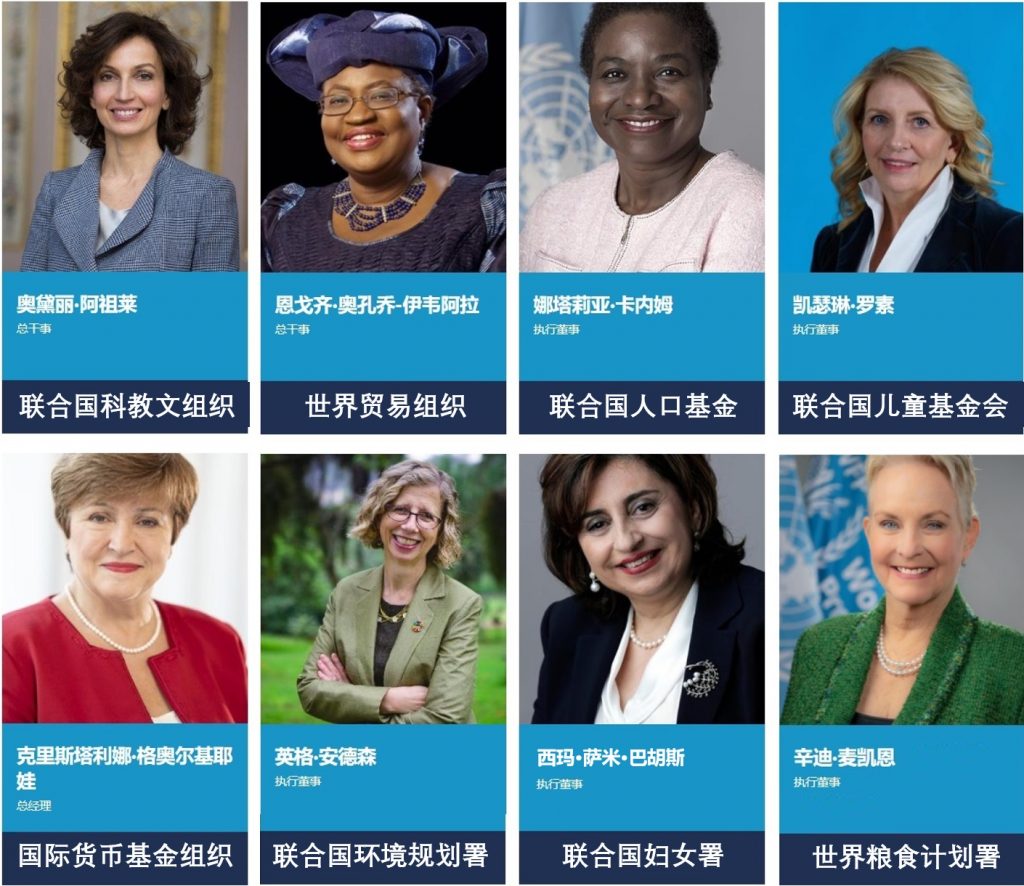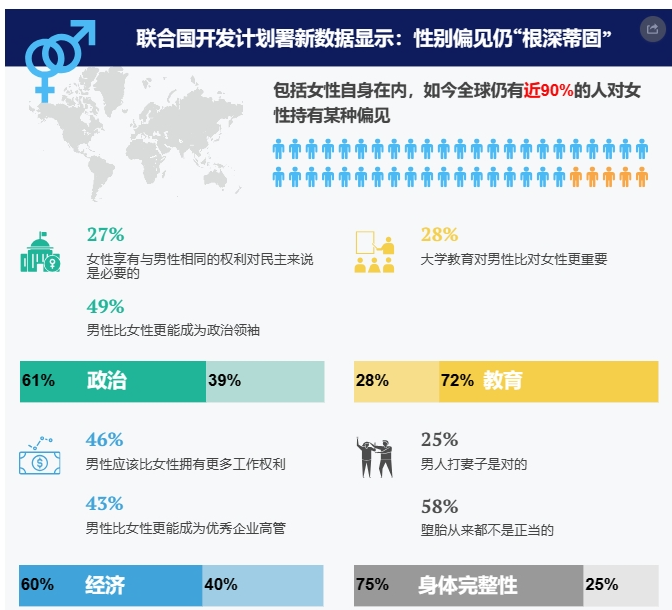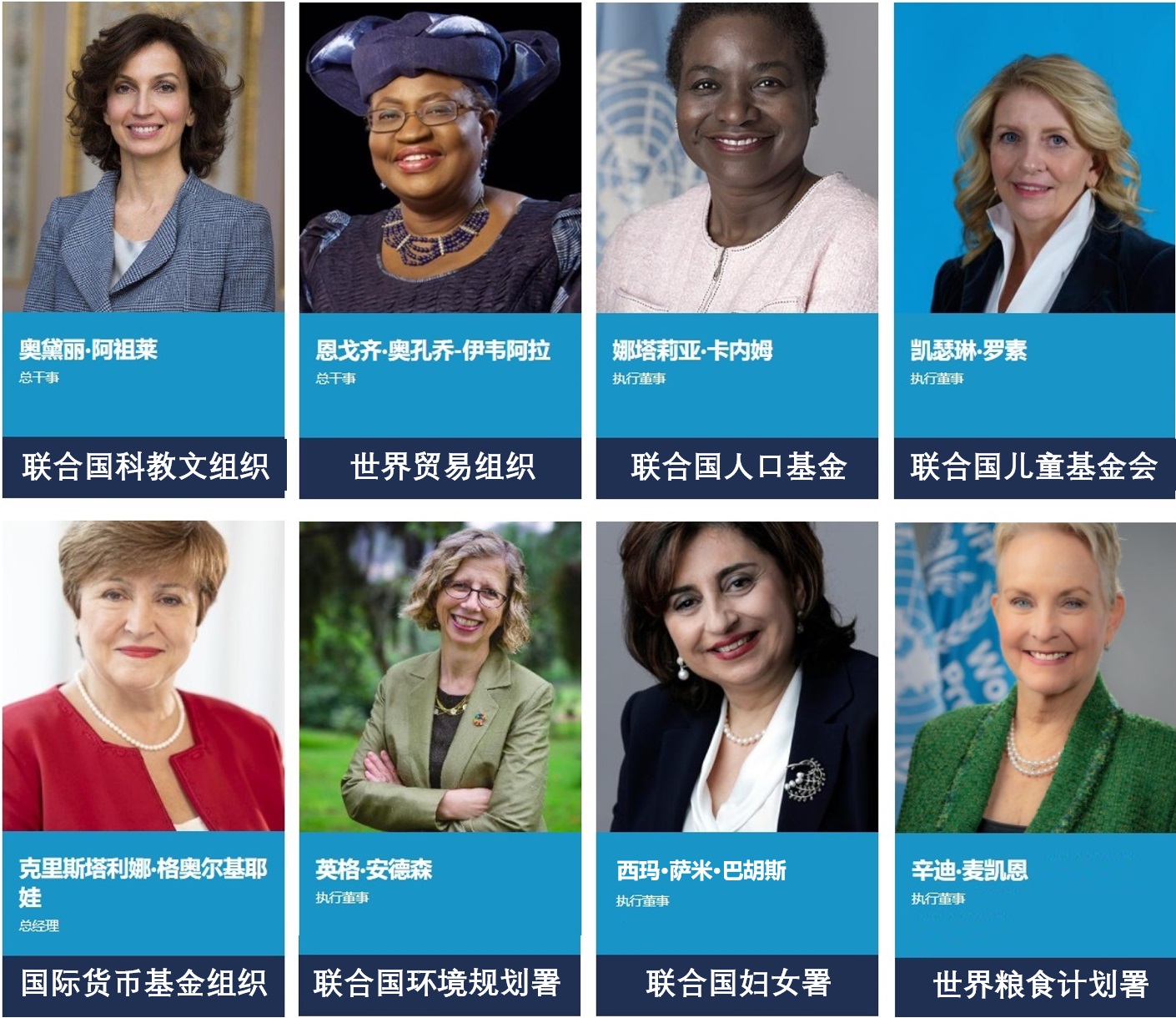Author: Sun Weiqing
What is the state of female leadership in international institutions?
Women play a vital role in global politics, economy, culture and family. Women are also an important force in international development. Gender equality is one of the 17 development goals of the United Nations 2030 Agenda for Sustainable Development (SDGs), which includes ensuring women’s full and effective participation in decision-making and equal opportunities to enter decision-making leadership at all levels. Although several major United Nations (UN) development agencies and international non-governmental organizations (INGOs) are currently led by women, the “2023 Gender Social Norms Index” released by the United Nations Development Program (UNDP) shows that gender Prejudices are still deeply ingrained, and there is still a long way to go to improve female leadership and achieve the Sustainable Development Goals of gender equality.
| VariedWhat?Is the Gender Social Norms Index? |
|
The 2019 Human Development Report introduced the gender social norms index for the first time, which reflects that people are beginning to view gender from the perspective of equal abilities and rights. The index is based on seven questions from the World Values Survey (WVS). It explores gender bias from four dimensions: politics, education, economics and physical integrity. It provides in-depth analysis of gender inequality and the root causes that hinder women's progress, highlighting the challenges women face in some fields. Systemic challenges and discrimination. The data of the 2023 Gender Social Norms Index covers 80 countries and regions between 2017 and 2022, covering a global population of 85%. The survey results show that nearly half of the people in the world believe that men are more suitable to be political leaders than women, and 40% people think that men are more suitable to be corporate executives than women. Dimensions and indicators of the Gender Social Norms Index
(UNDP/Photo) |
International agencies support promoting female leadership
United Nations agencies and relevant intergovernmental mechanisms are committed to promoting the development of female leadership through various initiatives and projects, providing training, mentorship support, advocacy and policy influence opportunities for female leaders, aiming to promote gender equality and women at the decision-making level. participation and leadership.
United Nations General Assembly(UNGA) adopts resolutions and declarations to emphasize the importance of gender equality and female leadership, and through political dialogue and diplomatic efforts, calls on countries to formulate and implement policy measures to promote women’s participation and leadership in the political, economic and social fields. The Convention on the Elimination of All Forms of Discrimination against Women, adopted by the United Nations General Assembly in 1979, has played an important role in eliminating discrimination against women and improving the status of women. It is known as the Women's Charter of Human Rights. China was one of the first countries to sign and ratify the Convention and has achieved remarkable results in improving women's social status and giving women more opportunities and rights.
UN Women(UN Women) is one of the major development agencies of the United Nations, established in 2010. Its predecessor was the United Nations Development Fund for Women (UNIFEM), which was established in 1976. UN Women is committed to promoting gender equality and women's rights, supporting and promoting the leadership of women in various fields in various countries through leadership development projects, advocacy and policy influence, data and research, and promoting the formulation and implementation of laws and policies related to gender equality. , and eliminate gender discrimination and promote women’s rights.
United Nations Development Program(UNDP) plays an important role in promoting women’s leadership. UNDP supports governments in developing policies and implementing programs to promote women's participation and leadership in political, economic and social decision-making. UNDP helps women develop leadership skills, advance their social status and advance the gender equality agenda by providing technical assistance, training and financial support.
united nations human rights council(UN Human Rights Council) focuses on gender equality and women’s rights, and strengthens women’s leadership by formulating and promoting relevant resolutions and statements. The Human Rights Council provides a platform to support women’s organizations and advocates to speak out and advance the gender equality agenda.
United Nations Commission on the Status of WomenThe Commission on the Status of Women (CSW) is one of the functional committees of the Economic and Social Council (ECOSOC) and is the main global intergovernmental body that promotes gender equality and women’s empowerment. The Committee is committed to promoting women's rights and gender equality in political, economic, social and educational fields. The secretariat of the committee is located at UN Women, and holds regular meetings to discuss and assess the progress of global women's rights and gender equality, and put forward policy recommendations and action plans.
global women's summit(Global Summit of Women) was established in 1990 to establish a global women's alliance, promote connections between influential female leaders in various fields, and improve the status of women in global political, economic and social activities. The summit provides a platform for public, private and non-profit organizations to communicate and collaborate to make positive contributions to promoting female leadership and gender equality. In 2015, China and UN Women jointly held the Global Women's Summit at the United Nations Headquarters in New York.
women's international league for peace and liberty(Women's International League for Peace and Freedom, WILPF) was founded in 1915. It is an international non-governmental organization dedicated to promoting peace, security and gender equality. It has consultative status with the United Nations Economic and Social Council. The organization supports women's leadership at decision-making levels through advocacy and policy influence, training programs and building women's networks.
Female leaders of international institutions set benchmark for gender equality
Today, when about half of the population still believes that men are more suitable as political leaders, many women have emerged as leaders at the United Nations and international non-governmental organizations, and have played a pivotal role in promoting gender equality. In 2020, for the first time ever, a United Nations agency achieved gender parity in all senior leadership positions. The theme of International Women's Day in 2021 is "Female Leadership: Achieving an Equal Future in the Context of the COVID-19 Epidemic", which reflects the tremendous contribution of women and girls around the world in promoting global recovery after the epidemic and achieving a more sustainable future, and demonstrates Demonstrate outstanding female leadership.
Some female leaders of United Nations development agencies

(UN/Image)
Advocate for gender equality.Female leaders of United Nations agencies actively advocate the importance of gender equality through high-level meetings, international forums, and media channels, communicate the value and benefits of gender equality to governments, businesses, and the public, and propose policy recommendations and action plans. For example, former Executive Directors of the United Nations Children's Fund (UNICEF) Carol Bellamy, Ann M. Veneman, and Henrietta H. Fore are developing initiatives and projects, improving child health, and strengthening global partnerships to empower adolescent girls.
Promote policy and legal development.By participating in international conferences and consultations, women leaders promote the formulation and reform of relevant policies and laws to ensure that gender equality is protected by law, work to eliminate gender discrimination, and promote the formulation of laws against gender-based violence and sexual harassment. For example, Gro Harlem Brundtland, the first female Director-General of the World Health Organization (WHO) and former Prime Minister of Norway, presided over two important initiatives in 1998, namely the Roll Back Malaria and Tobacco Free Initiatives. Global Health Project.
Resource Allocation and Assistance.Women leaders promote the implementation of gender equality by coordinating international aid and development projects. Committed to ensuring that women and girls have access to basic rights such as education, health care, employment and economic resources, and supporting women's participation in decision-making and leadership. Melinda Gates, Co-Founder of the Bill & Melinda Gates Foundation, is a recognized global leader dedicated to providing funding to develop programs through the Foundation to empower women. Empowering and promoting women's health.
Set an example.Female leaders themselves are role models for gender equality. Their existence and successful experiences encourage and promote other women to strive for leadership positions and break gender stereotypes and barriers. Their success helps eliminate gender discrimination, enhance the status of women, and promote the process of gender equality around the world.
Strengthen organizational collaboration and partnerships.Women leaders actively promote cooperation and partnerships between countries, civil society organizations and the private sector at the international level. They encouraged all parties to work together, share experiences and resources, and strengthen commitment and action on gender equality. For example, when Margaret Chan served as Director-General of the WHO, she organized the work of universal health coverage. In 2008, WHO and private and public sector partners agreed on the Global Strategy and Action Plan for Public Health, Innovation and Intellectual Property, which aims to reduce the cost of life-saving medicines and make them affordable for those in need.

(UNDP/Photo)
What challenges do women face in promoting global leadership?
Female leaders at workFacing sexism and stereotyping inimpression.These discriminations and challenges come not only from men, but also from the female community themselves. The abilities, experience and leadership of female leaders may be affected by gender bias. Many people believe that men are more capable and competitive than women, and believe that women are more suitable to take on auxiliary and assistive work.
Women's collarLeaders face opportunities for promotion and leadership positionsinequality.Structural barriers to gender inequality can limit women’s advancement and access to leadership. Gender gaps remain prominent in employment, career choices, and wages, with women often making up the majority in low-paying, low-status, and unstable jobs, while men are the majority in high-paying, high-status, and stable jobs.
Women often face conflicts between work and family responsibilities when pursuing leadership positionsbalance.Traditional social concepts assign women more roles in taking care of the family. The McKinsey report pointed out that society's expectations for women in the workplace and women's self-worth positioning are still affected by "men are at the forefront of the outside world and women are at the home level". These beliefs can create barriers for women to pursue leadership positions. For women already in senior leadership positions, work pressures and time demands may conflict with family life, creating additional stress.
Women's collarLeaders face a lack of support and mentorshipchallenge.A lack of successful female leaders as role models, and not enough female role models demonstrating successful leadership experiences and pathways, can lead to a lack of confidence and guidance for women. In male-dominated industries and organizations, women may face greater difficulty finding the right mentors. Additionally, women’s relatively low representation in leadership positions may also result in a lack of opportunities for them to network with and gain support from other female leaders.
How can international institutions develop and unleash female leadership?
The "Global Gender Gap Report 2023" points out that increasing women's economic participation and achieving gender equality in senior positions in politics and business are the two major driving forces for eliminating the gender gap. In order to accelerate the promotion of gender equality and cultivate female leadership, international institutions have adopted a series of policies and measures to promote the development of female leadership. These include:
gender equalitywaiting for opportunities andaccess:To promote women's leadership, United Nations agencies are committed to providing equal opportunities and access. They work to remove structural barriers to gender inequality and ensure that women can participate equally and advance into leadership positions. For example, the United Nations Security Council Resolution 1325 (2000) on Women, Peace and Security, adopted in 2000, urged the appointment of more women as special representatives and envoys, expanded the role of women in field operations, and emphasized the role of women in participating Important leadership role in conflict resolution and peace negotiations.
| What is the Women’s Leadership Platform? |
|
|
collarleadership development projectHead:To nurture and develop women leaders, UN agencies and international NGOs implement leadership development programs that provide training, mentoring, skills enhancement and career development opportunities, and build networks among women leaders to support women at the leadership level. Growth and development. For example, the Global Women's Leadership Network, founded in 2009, helps women develop leadership skills and promotes women's leadership in various industries and fields by providing training, mentorship programs and resource support.
combinepartnershipTie:UN agencies often work with international NGOs, governments and stakeholders to promote women’s leadership. They build partnerships to share best practices, resources and expertise including joint initiatives, knowledge sharing platforms and capacity building to empower women leaders. For example, in 2020, UNDP supported women-led community associations in 55 countries through its green portfolio and explored ways to connect these associations with wider networks and alliances.
researchresearch and data collectionset:Research, data collection and analysis of the gender gap in leadership positions and the barriers and challenges faced by women in leadership roles, identifying specific areas needed to promote women’s leadership, can be used to advocate for policy change and develop targeted interventions.
References
https://hdr.undp.org/system/files/documents/hdp-document/gsni202303pdf.pdf
https://news.un.org/zh/story/2023/06/1118722https://www.un.org/zh/81553
https://www.un.org/en/un-chronicle/future-we-want-requires-more-women-diplomacy
https://www.un.org/sg/en/content/sg/articles/2022-03-08/sustainable-feminist-recovery
https://apps.who.int/gb/ebwha/pdf_files/EB146/B146_15-ch.pdf
https://news.un.org/en/story/2022/09/1127081
https://www.un.org/zh/conferences/women
https://unsceb.org/board-members
https://www.unwomen.org/sites/default/files/2023-05/WPS-resolutions-poster-2022-web-zh.pdf

All rights reserved, please indicate the source when citing.

